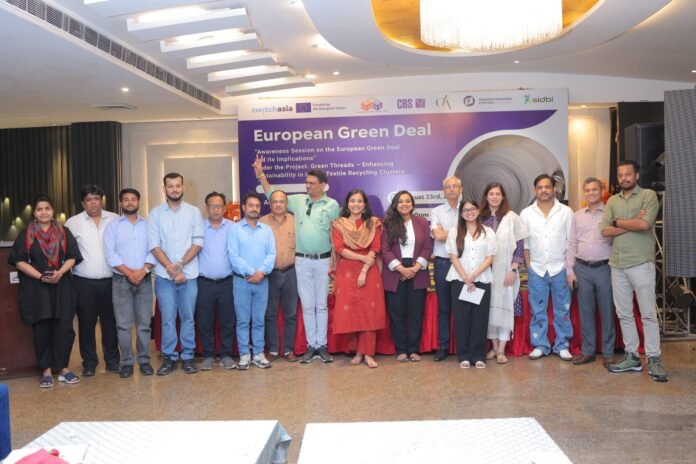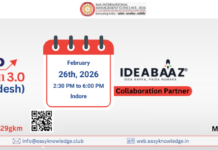Panipat, Haryana, India | 27th August 2025: The Foundation for MSME Clusters (FMC), as the implementing partner of the EU-funded Green Threads programme under SWITCH-Asia, in collaboration with the Panipat Exporters Association, organized a crucial workshop at Days Hotel by Wyndham, Panipat. The event highlighted the European Union’s fast-evolving sustainability requirements for the textiles and apparel industry, including compliance, traceability, eco-design, and environmental accountability.
The workshop was attended by prominent industry leaders, including:
- Mr. Lalit Goyal, President, Panipat Exporters Association
- Mr. Vinod Dhamija, President, Haryana Chamber of Commerce and Industry
- Mr. Rajat Grover, President, Young Entrepreneurs Society
- Mr. Puran Rawal, Vice President, Young Entrepreneurs Society
- Mr. Parvinder Singh, Director, Global Alliance for Textile Sustainability (GATS)
- Mr. Nitin Arora, President, Dyer Association
Their presence underscored the strong commitment of Panipat’s textile industry toward sustainable transformation.
Why EU Sustainability Guidelines Matter for Panipat
Opening the session, Mukesh Gulati, Executive Director of FMC, stressed the urgency for Panipat’s exporters to adapt to international sustainability standards. He reiterated FMC’s role as a long-term partner in making Panipat a global hub for circular textiles.
The urgency is clear:
- The fashion industry accounts for 10% of global carbon emissions.
- It contributes to 20% of wastewater pollution.
- Annually, it generates 92 million tonnes of textile waste.
- Less than 1% of textiles are recycled into new garments.
In response, the EU has introduced strict textile sustainability rules, requiring exporters to ensure garments are durable, recyclable, traceable, and eco-friendly. For Panipat, a city known for recycling a major share of India’s textile waste, this presents a strategic opportunity to modernize and lead the global textile sustainability movement.
Key Highlights from the Workshop
The session featured global sustainability experts:
- Harshita, Global Fashion Agenda (GFA): Spoke on the EU Textile Strategy, eco-design standards, durability, and the upcoming Digital Product Passport (DPP).
- Ina Bahungna, Reverse Resources: Explained traceability systems enabling exporters to comply with Extended Producer Responsibility (EPR) mandates.
- Chinky Yadav, Green Story: Demonstrated how the DPP can track a product’s lifecycle—from raw materials to recycling—helping businesses prove their environmental accountability.

Green Threads Consortium Driving Change
The Green Threads programme, funded by the European Union under SWITCH-Asia, is powered by a strong consortium:
- FMC – implementing partner in Panipat
- Copenhagen Business School (CBS) – research on sustainability branding & traceability
- SIDBI – enabling green financing for MSMEs
- Global Fashion Agenda (GFA) – advancing policy & industry engagement
- Reverse Resources – offering traceability technology
- Green Story – lifecycle and impact measurement
Together, the consortium aims to:
- Position Panipat as a global sustainable textile hub
- Introduce Digital Product Passports for transparency
- Boost MSME capacity in eco-friendly production
- Expand access to green financing through loans, equity, and grants
Panipat’s Path to Becoming a Global Circular Textile Hub
The workshop attracted exporters, HR leaders, and compliance managers, equipping them with knowledge on EU carbon tax, sustainability mandates, and financing opportunities.
With Green Threads, funded by the European Union, and led by FMC and its consortium partners, Panipat is not just preparing for regulatory change—it is embracing the chance to emerge as a leader in circular fashion. This initiative will not only strengthen Panipat’s role in India’s sustainable textile industry but also enhance its global export competitiveness.







